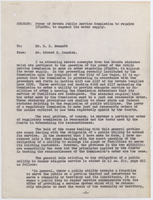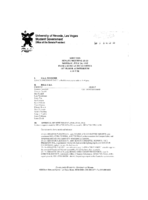Search the Special Collections and Archives Portal
Search Results

Jolie Brislin oral history interview: transcript
Date
Archival Collection
Description
Oral history interview with Jolie Brislin conducted by Barbara Tabach on April 21, 2017 for the Southern Nevada Jewish Heritage Project. In this interview, Brislin discusses her family background and upbringing in Redwood City, California. She remembers moving to Las Vegas, Nevada in 1991, her involvement in the Jewish community, and going on a trip to Israel. Brislin talks about joining the Anti-Defamation League, becoming the Regional Director of the organization in 2015, and her mentors at the time. Lastly, Brislin discusses the rise of hate acts towards minority groups across the country, and the issue of cyber-bullying.
Text

Dr. Deborah Kuhls oral history interview: transcript
Date
Archival Collection
Description
Oral history interview with Dr. Deborah Kuhls conducted by Barbara Tabach on December 29, 2017 for the Remembering 1 October Oral History Project. In this interview, doctor Deborah A. Kuhls describes the preparation and procedures implemented at the University Medical Center of Southern Nevada (UMC) during the night of the October 1, 2017 mass shooting in Las Vegas, Nevada. She describes her experiences from that night and into the next morning, starting from when the trauma center first learned about the shooting to when patients began arriving. She goes into detail on the hospital's Military-Civilian Trauma System Partnership, which allowed for the installation of a second trauma area to treat the large volume of patients. In addition to the events at the hospital, Kuhls talks about the flurry of activities during the week of the shooting, including interviews with various media, the statewide meeting for surgeons, fellows, and residents where "stop the bleed" training was provided, and general meetings with various government officials, including Donald Trump. Deborah Kuhls also discusses the emotional impact of the shooting and its aftermath as well as her goals for the future of trauma in the medical field.
Text

Michael Arage oral history interview: transcript
Date
Archival Collection
Description
Oral history interview with Michael Arage conducted by Dalton DuPré on November 12, 2021 for Reflections: The Las Vegas Asian American and Pacific Islander Oral History Project. In this interview, Michael Arage discusses his upbringing in the Greater Toronto Area (GTA), Ontario, Canada with his sister and his Filipino-Palestinian heritage. He talks about how his parents immigrated to the United States, his life and education in Toronto, and his relocation to Los Angeles, California where he married his wife. Michael Arage shares how the couple moved to Las Vegas, Nevada in 2012 when his wife started a job at Zappos. Because he lacked a work visa, Michael Arage began playing poker and working in sports betting. In 2019, he founded a community organization to support the people of Palestine, called Nevadans for Palestinian Human Rights. Michael Arage talks about his activism efforts, anti-Arab racism, his cultural upbringing, and of Filipino and Arabic foods and customs. He also shares his views of living in Las Vegas, the difficulties of raising a child away from her cousins, and differing governmental policies and healthcare between Canada and the United States.
Text

Zoe Albright oral history interview: transcript
Date
Archival Collection
Description
Oral history interview with Zoe Albright conducted by Barbara Tabach on October 16, 2018 for the Remembering 1 October Oral History Project. In this interview, Albright describes her work as a volunteer for the Red Cross and helping comfort those who came into the Metro Police Station after the 1 October shooting, searching for family and friends who were present at the Route 91 Harvest Festival. In addition to being a Red Cross volunteer, Albright is also a personal trainer, nutrition consultant and resident of Las Vegas since 1988.
Text

Mach and Arlene Manuel oral history interview: transcript
Date
Archival Collection
Description
Oral history interview with Mach and Arlene Manuel conducted by Kristel Peralta and Stefani Evans on June 28, 2021 for Reflections: The Las Vegas Asian American and Pacific Islander Oral History Project. Mach and Arlene Manuel share the story of their overseas courtship and how they came to be together in the United States. Arlene was raised in the Philippines while Mach was born and raised in San Diego, California. Mach describes his visit to the Philippines as an adult when he began to connect more to his Filipino heritage. The couple shares how they dated for 13 years before Arlene moved to San Diego, and how the Manuel family came to live in Las Vegas in 2017 to pursue Arlene's nursing career. Arlene and Mach talk about cultural differences and discrimination, emigration and diversity, religion and identity, and Filipino food, among other topics. Subjects discussed include: Manila, Philippines; discrimination of class; and anti-Asian hate.
Text

Transcript of interview with Joan Johnson by Kim Geary, March 25, 1978
Date
Archival Collection
Description
On March 25, 1978, Kim Geary interviewed Joan Johnson (born 1911 in Oklahoma) in her home in Las Vegas, Nevada. The two discuss Joan Johnson’s personal history and her reasons for originally moving to Las Vegas. Johnson recalls early Las Vegas entertainment, as well as the development of businesses and their unions.
Text

Transcript of interview with Harvey Diederich by K.J. Evans, January 4, 1999
Date
Archival Collection
Description
Text

Transcript of interview with Clarles Alvin (Todd) Early conducted by Brenda Sue Cody, March 25, 1981
Date
Archival Collection
Description
Text

Memo from Edward C. Renwick to E. E. Bennett about the Las Vegas Land and Water Company being required to augment its water supply, 1952
Date
Archival Collection
Description
Discussion of the relevant legal issues and court decisions relating to the question of whether the railroad could be forced to increase water production
Text

Meeting minutes for Consolidated Student Senate University of Nevada, Las Vegas, July 24, 1995
Date
Archival Collection
Description
Text
